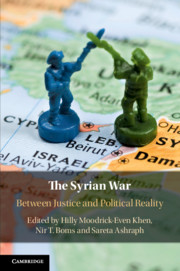Book contents
- The Syrian War
- The Syrian War
- Copyright page
- Dedication
- Contents
- Acknowledgements
- Contributors
- Abbreviations
- Table of Treaties
- Table of Cases
- 1 Introduction
- Part I The Syrian War
- Part II The Syrian Neighbourhood
- 8 Proxy Wars in Syria
- 9 A Northern Dilemma
- 10 The Spillover Effects of the Syrian Civil War
- 11 Syrian Refugees in Europe
- Part III A New Syria in a New World Order?
- Index
10 - The Spillover Effects of the Syrian Civil War
Regional Ramifications for Refugees
from Part II - The Syrian Neighbourhood
Published online by Cambridge University Press: 16 December 2019
- The Syrian War
- The Syrian War
- Copyright page
- Dedication
- Contents
- Acknowledgements
- Contributors
- Abbreviations
- Table of Treaties
- Table of Cases
- 1 Introduction
- Part I The Syrian War
- Part II The Syrian Neighbourhood
- 8 Proxy Wars in Syria
- 9 A Northern Dilemma
- 10 The Spillover Effects of the Syrian Civil War
- 11 Syrian Refugees in Europe
- Part III A New Syria in a New World Order?
- Index
Summary
By the end of 2017, some 6 million Syrians had fled Syria, mostly to surrounding countries. Syrian refugees have been able to survive due to stop-gap efforts by aid agencies and the UN, as well as donor nations and mostly sympathetic host governments. However, aid agencies have had chronic funding shortages, and the refugee crisis has put host governments under political and economic pressure. This chapter surveys some of what is known about the situation of Syrians outside of Syria who have stayed in the region and argues that – considering the dangers posed by concentrations of impoverished refugees – the international community should take a pro-active and pragmatic approach that encourages host countries to absorb Syrians into their sociopolitical systems as much as possible to avoid leaving them in limbo for the undetermined future. It posits that the present chaotic situation, with ongoing instability and violence in Syria, raises larger questions about community cohesion, Syrian national identity, and whether the present wave of Syrians who were dispersed and displaced since 2011 may be seen less as (refugees) or (migrants) and more as the start of a new ’diaspora’.
- Type
- Chapter
- Information
- The Syrian WarBetween Justice and Political Reality, pp. 198 - 216Publisher: Cambridge University PressPrint publication year: 2020



